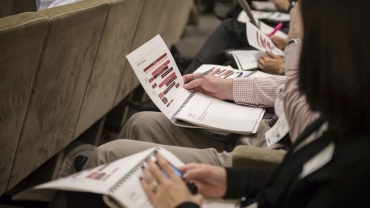
Poland remains among the top EU states in supporting its families
The average amount of EU state aid in respect to allowances for children and family benefits is approximately EUR 2,383 per year. According to a report by the advisory company PwC “Allowances and benefits to support families in EU states — 2017”, for Poland, the amount is PLN 8,225. When compared with the average salary, this amount translates into the 4th rank among 28 EU states — the same status as in the previous year. Experts stress the fact that a positive and lasting trend is achieved by those states which in addition to financial aid have also implemented systemic solutions.
For the purposes of the “Tax allowances and family benefits in the EU — 2017” report, the PwC advisory company has performed a simulation model in order to assess the aid which can be expected in 2017 by an average family consisting of two working parents earning an average salary with two healthy children aged 4 and 8. The data gathered in the report suggest that the average amount of direct aid from EU states for children and family allowances and benefits is currently approximately EUR 2,383 per year. Top states in the ranking are Luxembourg (EUR 7,538) and France (EUR 6,786). In Poland, financial aid for families amounts to approximately EUR 1,926 (PLN 8,225), which places Poland in the middle of the ranking. However, when the amount of support is compared with the average salary in the given country, Poland ranks fourth — after France, Hungary and Austria.
“The negative demographic trend is a challenge not only for Poland, but to the majority of countries on the (European) continent. Still, the birth rate in our country is among the lowest. According to the PwC forecast, in 2050 Poland can become one of the world’s fastest developing economies. The main obstacle to this is demographics. That is why it matters so much how at this moment we systematically and lastingly implement a successful family support policy” — says Tomasz Barańczyk, Managing Partner of Tax & Legal Department at PwC Polska.
As PwC experts point out, in most EU states, a relationship between family support tax incentives and tax reliefs and a high fertility rate has been observed. One example is France with the highest level of family support in the EU coupled with the highest birth rate. But there are exceptions, such as Germany, where high financial support for families has not so far influenced the birth rate.
As a result of the introduction of the 500+ Programme in 2016, Poland has joined the top states providing the highest financial support in relation to the average salary in the state. Data from the Central Statistical Office suggests that in the period from January to August this year, approx. 272 thousand children were born in Poland, which means a growth of 7% in relation to the corresponding period in 2016, and nearly a 10% increase in comparison with the corresponding period in 2015.
“When analysing the elements of family support policy in European Union states, we noticed that direct financial support for families is not enough to influence the demographic trend. Countries which can boast the highest success rate in terms of family support policies, such as France, United Kingdom, Sweden or Denmark, have implemented long-lasting systemic solutions — scheduled for years — based on parents' real expectations, in this way building trust for state-initiated programs, which is a crucial factor for the success of such actions” — comments Joanna Narkiewicz-Tarłowska, Director in Tax & Legal Department at PwC Polska.
PwC experts point out that the family support policy may be supplemented with local actions, thus positively reinforcing demographic trends. An additional analysis prepared by PwC in collaboration with Leon Kozminski Academy in Warsaw and Duale Hochschule Baden-Württemberg in Mannheim indicates that the lowest birth rate in 2016 was recorded in the Opole Voivodeship (1.2), while the highest in the Pomeranian Voivodeship (1.5).
Effective tools for our family support policy
In Sweden, a consistent family support policy has been in place for many years, enabling the reconciliation of professional career growth along with family life. One key aspect thereof is equality, both in the professional and private sphere. Such an approach contributes to the greater professional activation of women and greater involvement of men in family life. Sweden introduced a bonus for not wasting time — if the next child is born within 30 months from the birth of the previous child, the parental leave may be extended by as much as a year.
Latvia, which boasts the highest birth rate growth within the last few years, attained its good results by, among other things, broadening the group of people entitled to receive these benefits and unification of the rules for awarding benefits. Implementation of the national programme for treating infertility has also been played a vital role.
Employers' roles in carrying out family support policy
The PwC report suggests that an important role in the successful implementation of the family support policy is played by employers. According to data gathered in the report, 30% of Polish women give up having children due fear of a facing a potential conflict between home–work responsibilities. Poland is among the last countries to implement flexible employment forms. The number of hours spent by women at the workplace is growing systematically. This is reflected in the time spent by children at early education and care facilities — the Polish result is among the highest in Europe: by 13 hours more than the EU average for children up to 3 years old and by 6 hours more than the EU average for children above 3 years old.
As part of family support policy, employers can support their employees taking care of children by offering adjusted programmes in four main areas, i.e. flexible working time (e.g. ability to work part-time, from home, additional paid maternity leave, and work-share options), appropriate infrastructure (e.g. mother and child rooms, rooms where a mother with a child can rest), financial and material aid (e.g. maternity grants, one-time support after childbirth for buying carriages, participation in the costs of pregnancy and childbirth, medical packages) as well as information-training aid (e.g. trainings to facilitate company reintegration after maternity/parental leave).
Subscribe for a newsletter
Stay up to date with the latest news
Contact us

CEE Director of Brand and Communications, PwC Central and Eastern Europe
Tel: +48 519 506 633









